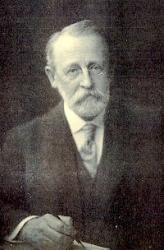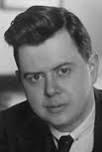Planning worship?
Check out our sister site, ZeteoSearch.org,
for 20+ additional resources related to your search.
- |
User Links
Person Results
S. M. Bixby
1833 - 1912 Composer of "MOOSILAUK" in Gloria Deo Samuel M. Bixby was born on May 27, 1833 in Haverhill, New Hampshire. His company, S. M. Bixby & Company, manufactured shoe blackings and shoe dressings, but music was his passion. He was also a Sunday school superintendent and choir leader. He died on March 11, 1912 in Fordham, New York. His works include:
Church and Home Hymnal, circa 1893
Evangel Songs, circa 1894
Gloria Deo: A Collection of Hymns and Tunes for Public Worship in All Departments of the Church (New York: Funk & Wagnalls Company, 1901)
NN, Hymnary. Source: http://www.hymntime.com/tch/bio/b/i/x/bixby_sm.htm
S. M. Bixby
William Wallace Gilchrist

1846 - 1916 Person Name: W. W. Gilchrist Composer of "[Light of light, enlighten me]" in The New Hosanna Born: January 8, 1846, Jersey City, New Jersey.
Died: December 20, 1916, Easton, Pennsylvania.
Buried: Saint Thomas’ Episcopal Church, Fort Washington, Pennsylvania.
Gilchrist’s family moved to Philadelphia, Pennsylvania, when William was nine years old. He attended school there until the outbreak of the American civil war, when his father’s business failed and William had to seek other work. Having a good voice, he sang in choirs and choruses, first as a soprano, and later a smooth, flexible baritone. He began singing some of the principal parts in the Handel and Haydn Society, where his first real musical life began.
At age 19, Gilchrist began studying organ and voice with Professor H. A. Clarke, gradually concentrating on theory. At age 25, he spent a year in Cincinnati, Ohio, as organist and teacher, returning to Philadelphia to take post of choir master at St. Clement’s Protestant Episcopal Church. He later became conductor of the Mendelssohn Club, Tuesday Club of Wilmington, and Philadelphia Symphony Society.
Gilchrist was best known as a composer. His first success was in 1878, winning two prizes from the Abt Society of Philadelphia for best choruses for male voices. In 1881, he won three similar prizes from the Mendelssohn Glee Club of New York. In 1884, he took a $1,000 prize from the Cincinnati Festival Association; the judges included Saint-Saëns, Reinecke, and Theodore Thomas. This work was an elaborate setting of the Forty-Sixth Psalm, and was enthusiastically received. Gilchrist afterwards modified it and brought it out at the Philadelphia Festival in 1885.
Gilchrist also served as editor of the 1895 Presbyterian hymnal, as musical editor of The Magnificat in 1910, and wrote symphonies, chamber and choral music. His works include:
An Easter Idyll
Psalm 46 (New York: 1882)
One Hundred and Third Psalm
Ninetieth Psalm
Fifth Psalm
Prayer and Praise
De Profundis
The Rose (New York: 1887)
Ode to the Sun
A Christmas Idyll (Boston, Massachusetts: 1898)
The Lamb of God (New York: 1909)
© The Cyber Hymnal™ (hymntime.com/tch)
William Wallace Gilchrist
Sir Ernest MacMillan

1893 - 1973 Person Name: Ernest Campbell MacMillan, b.1895 Composer of "LIGHT OF LIGHT" in The Book of Praise Ernest MacMillan (Conductor)
Born: August 18, 1893 - Mimico, Canada
Died: May 6, 1973 - Toronto, Canada
The eminent Canadian conductor and composer, Sir Ernest (Alexander Campbell) MacMillan, began his organ studies with Arthur Blakeley in Toronto at age 8, making his public debut at 10. He continued his organ studies with A. Hollins in Edinburgh from 1905 to 1908, where he was also admitted to the classes of F. Niecks and W.B. Ross at the University.
Ernest MacMillan was made an associate (1907) and a fellow (1911) of London’s Royal College of Organists, and in 1911 received the extramural Bachelor of Music degree from the University of Oxford. He studied modern history at the University of Toronto from 1911 to 1914, before receiving piano instruction from Therese Chaigneau in Paris in 1914. In 1914 he attended the Bayreuth Festival, only to be interned as an enemy alien at the outbreak of World War I. While being held at the Ruhleben camp near Berlin, he gained experience as a conductor. He was awarded the B.A. degree in absentia by the University of Toronto in 1915. His ode, England, submitted through the Prisoners of War Education Committee to the University of Oxford, won him his Doctor of Music degree in 1918.
After his release, Ernest MacMillan returned to Toronto as organist and choirmaster of Timothy Eaton Memorial Church from 1919 to 1925. In 1920 he joined the staff of the Canadian Academy of Music, and remained with it when it became the Toronto Conservatory of Music, serving from 1926 to 1942 as its principal. He was also dean of music faculty at the University of Toronto from 1927 to 1952.
Ernest MacMillan was conductor of the Toronto Symphony Orchestra from 1931 to 1956, and of the Mendelssohn Choir there from 1942 to 1957. He also appeared as guest conductor in North and South America, Europe, and Australia. He served as president of the Canadian Music Council from 1947 to 1966, and of the Canadian Music Centre from 1959 to 1970. In 1935 he was the first Canadian musician to be knighted, an honour conferred upon him by King George V. He also received honorary doctorates from Canadian and USA institutions. He conducted many works new to his homeland, both traditional and contemporary.
--www.bach-cantatas.com/
Sir Ernest MacMillan


 My Starred Hymns
My Starred Hymns

